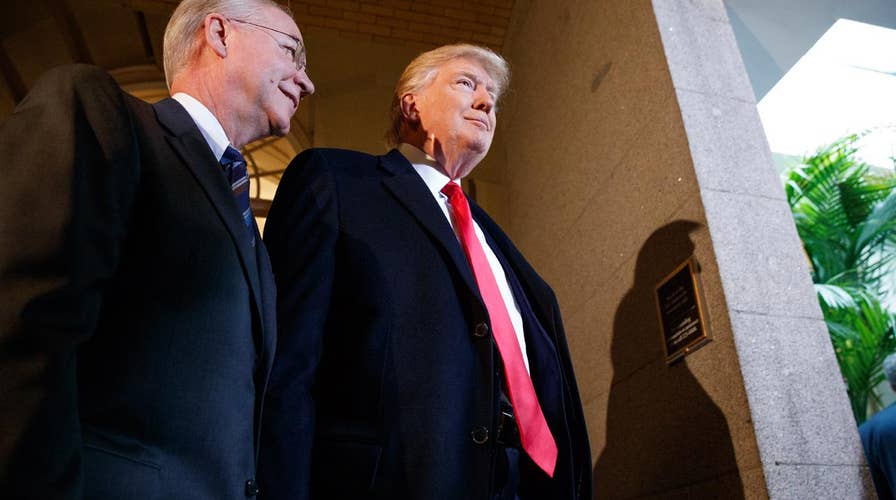Will Trump's final pitch on a health care deal work?
Strategy Room: David Mercer and Bradley Blakeman on the White House's strategy towards House Republicans
It is the most seminal moment in the early presidency of Donald Trump.
But it could define him forever.
Either the Republican-controlled House of Representatives approves a plan to repeal and replace ObamaCare -- or it doesn’t. House Speaker Paul Ryan, R-Wis., himself characterizes this nexus as a “binary choice.” The outcome is either an epic victory or a catastrophic defeat. The deal-maker-in-chief told House Republicans as much when he journeyed to Capitol Hill Tuesday morning to make his closing argument on health care.
“A loss is not acceptable, folks,” the president warned when speaking in private to House Republicans.
Trump augured that Republicans could very well lose control of Congress if they stumble.
“I think we’ll get the vote Thursday,” the president told reporters as he departed the confab. “I think we will get a winner vote.”
Visits to Congress to implore lawmakers to support major legislative initiatives are tricky for presidents. President Obama came to Capitol Hill in June 2015 to cajole members of his own party to back a framework for the Trans-Pacific Partnership (TPP) trade pact. Obama’s petition failed. TPP is now dead.
This congressional expedition carries particular risk for Trump. His “art of the deal” bluster will resemble grandiose braggadocio should his entreaties fail with members of his own party.
It only takes 21 Republican defections to torpedo the legislation in the House. House Freedom Caucus leader Rep. Mark Meadows, R-N.C., contends he has more than enough members to quash the legislation unless there are changes.
Vice President Pence invited Meadows into a one-on-one audience in his Capitol Hill House office Tuesday afternoon. But to no avail.
“Did he put on pressure? Yes,” said Meadows of the vice president’s efforts. “Was it brass knuckles and bare fists? No.”
“I thought the president did a good job,” said Rep. Jim Jordan, R-Ohio, another Freedom Caucus leader. “But that doesn’t change the four corners of the document.”
Could more changes come to the bill?
“I’m still waiting,” said Rep. Dan Donovan, R-N.Y., who met with the president Tuesday and isn’t yet committed. “I don’t know when it’s locked down and there can’t be any changes.”
We’ll know more if the bill is “locked down” soon. As he departed the Capitol Tuesday, Trump said “there are going to be adjustments made.”
The House Republican leadership team already engineered a host of changes for the bill Monday night through what’s called a “manager’s amendment.” This is a series of alterations on taxes, Medicaid and work requirements designed to capture a number of GOP votes. House leaders plan to Velcro the manager’s amendment onto the bill Wednessday in the House Rules Committee – the final way station for legislation en route to the House floor.
The Rules Committee determines what, if any, amendments are in order for debate on a bill and decides how much time the House devotes to a given issue. Expect a cavalcade of lawmakers to trek up to the Rules Committee in what could be an all-day session to try to persuade Chairman Pete Sessions, R-Texas, to make their amendments in order for debate.
Rep. Mo Brooks, R-Ala., has an amendment which simply repeals the original Affordable Care Act (ACA) by the end of next year. Rep. Glenn Grothman, R-Wis., authored an amendment to slash the “kids on insurance” provision from age 26 to age 23. Rep. Jamie Herrera Beutler, R-Wash., crafted an amendment to exempt children from state Medicaid block grants.
It’s unclear if the Rules Committee will permit any amendments on the floor if the measure goes to debate Thursday. But the Republican leadership team could do so if it believes a given amendment scores the votes to pass the bill.
What is past is prologue.
In November, 2009, then House Speaker Nancy Pelosi, D-Calif., didn’t have the votes to approve the original version of ObamaCare. So Pelosi made the decision for the Rules Committee to make two amendments in order. One was a Republican “alternative” to the Democrats’ plan. The other amendment was the “Stupak amendment,” written by then Rep. Bart Stupak, D-Mich. The Stupak amendment built an additional firewall to prevent federal dollars from covering abortion services. The House accepted the Stupak amendment and incorporated its provisions into the ACA. As a result, the successful adoption of the Stupak amendment secured the votes of more than a dozen pro-life Democrats. The House approved the first version of Obamacare on a razor-thin, 220-215 vote.
If Republicans are to repeal and replace ObamaCare, they may need to concoct a similar silver bullet like the Stupak amendment to marshal the necessary votes.
Granted, some Republicans are “undecided” because they may represent challenging districts. Those lawmakers may vote yes if the House is passing the measure. Or, if those members really want to vote no, they’ll wait to see if the plan tanks and then cast a nay ballot. Some Republicans are holding out to extract concessions from leaders. A few are posturing. A handful of GOPers are “in case of emergency, break glass” votes. In other words, House Majority Whip Steve Scalise, R-La., will keep those members in his hip pocket to vote yes if they get into trouble on the floor. Scalise will cut those members loose if it’s clear the House has the votes to okay the bill and those votes aren’t necessary.
One of the 11 steps in Trump’s book "The Art of the Deal" is to “deliver the goods.”
Trump made some progress Tuesday. But he hasn’t yet closed the deal.
Capitol Attitude is a weekly column written by members of the Fox News Capitol Hill team. Their articles take you inside the halls of Congress, and cover the spectrum of policy issues being introduced, debated and voted on there.





